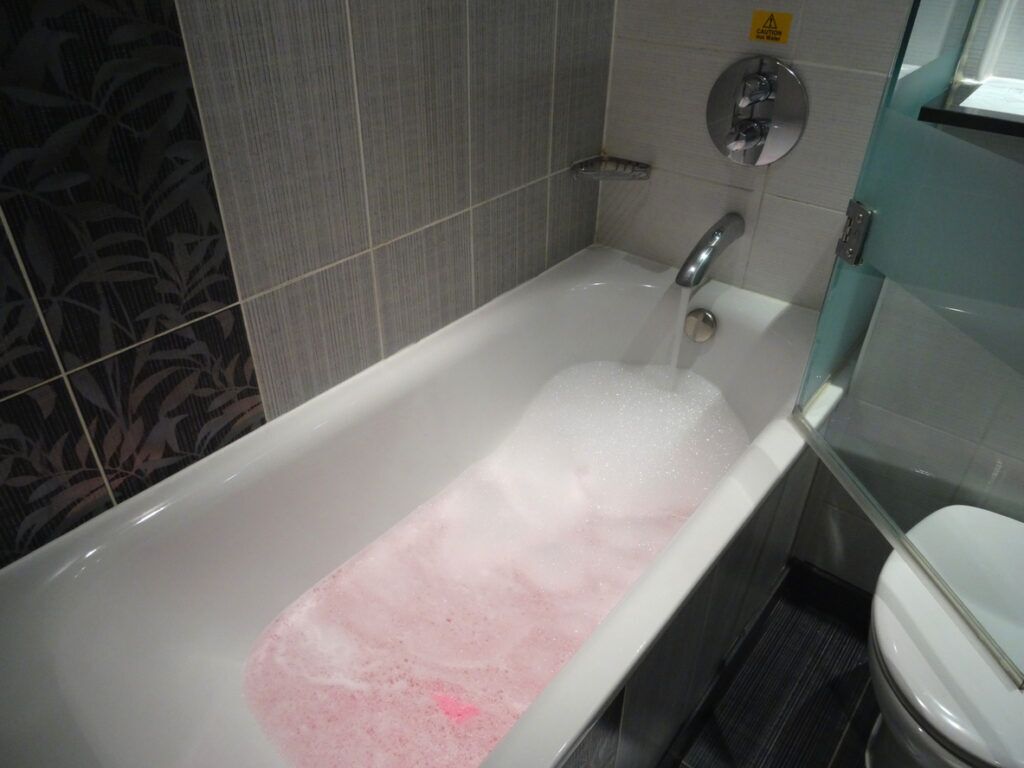Causes for Waste Rising Through the Bathtub
Causes for Waste Rising Through the Bathtub
Blog Article
This article underneath pertaining to What To Do If Sewage Starts Backing Up Into the Shower is extremely enjoyable. Don't miss out on it.

Sewer back-up in the tub can be a stressful and unhygienic issue for any kind of home owner. Not just is it bothersome, yet it additionally presents serious health risks and shows underlying concerns with the plumbing system. Recognizing why sewage is turning up with the bathtub is essential for taking suitable action to resolve the trouble properly.
Intro to the Problem
Common Factors for Sewer Back-up
Obstructions in the Sewer Line
Among one of the most typical sources of sewer back-up is an obstruction in the drain line. This can occur as a result of the buildup of particles, grease, or international objects in the pipelines, avoiding proper circulation and creating sewage to support into your bathtub.
Tree Root Breach
Tree origins looking for moisture and nutrients can infiltrate drain lines with tiny fractures or joints. With time, these origins can expand and expand, causing significant damage to the pipes and resulting in sewer back-up problems.
Recognizing the Trouble
When sewer draws back up into the tub, it's a clear indicator of an issue with the drain system. The wastewater that must be streaming far from your home is rather locating its back right into your space, which can bring about substantial damages and health hazards.
Potential Reasons
Numerous variables can add to sewer backup in the bath tub. From clogs in the drain line to problems with the plumbing facilities, identifying the root cause is important for finding an option.
Aging Facilities
Older homes may have outdated plumbing systems that are more susceptible to corrosion, fractures, and degeneration. As pipes age, they become extra vulnerable to leaks and blockages, raising the probability of sewage backup cases.
Heavy Rainfall or Flooding
During periods of heavy rainfall or flooding, the drain system may end up being overwhelmed with excess water, creating backups and overflows. This can result in sewer backing up right into bathtubs and various other fixtures inside the home.
Indicators of Sewage Backup
Foul Odors
Undesirable odors originating from drains or fixtures, especially in the restroom, might suggest sewer backup issues. These smells are commonly strong and relentless, signifying a problem that calls for instant attention.
Slow Draining Fixtures
Bath tubs, sinks, and toilets that drain pipes slowly or otherwise in any way could be experiencing sewage back-up. If multiple components are affected all at once, it's likely that the concern originates from an usual point, such as the major sewer line.
Gurgling Sounds
Strange gurgling or gurgling sounds coming from drains pipes when water is running elsewhere in your home are indicative of air caught in the plumbing system. This air build-up can result from sewer back-up and ought to be checked out promptly.
Health And Wellness Threats Connected With Sewer Backup
Contamination of Supply Of Water
Sewer backup can contaminate the water system in your house, positioning a severe wellness risk to you and your household. Direct exposure to contaminated water can result in intestinal concerns, skin infections, and other diseases.
Mold and mildew Development
Dampness from sewer backup can develop ideal problems for mold and mildew development in your house. Mold spores can intensify respiratory issues and create allergies in sensitive individuals, making prompt clean-up important.
Spread of Illness
Sewer consists of unsafe bacteria, viruses, and parasites that can cause a variety of illness, including hepatitis, cholera, and gastroenteritis. Coming into contact with sewage or polluted surfaces places you at risk of infection.
Tidying up After Sewage Back-up
Disinfection Procedures
Extensively decontaminate and sanitize affected areas after sewer back-up to get rid of harmful bacteria and protect against mold development. Usage appropriate cleaning products and protective gear to make sure safe and effective cleanup.
Restoration of Affected Locations
Fix any type of damage to flooring, wall surfaces, or components triggered by sewage backup. Relying on the degree of the damage, you may require to change carpeting, drywall, or various other products to restore your home to its pre-loss problem.
Immediate Actions to Take
Switching Off Water System
In the event of sewage back-up, it's necessary to turn off the water to avoid additional contamination and damages. Find the main water shutoff valve in your house and shut it off until the concern can be solved.
Getting In Touch With a Professional Plumber
Managing sewage back-up is not a DIY job. Get in touch with an accredited plumber with experience in managing sewage-related problems to evaluate the scenario and carry out essential repair services or cleanups.
Staying Clear Of Contact with Polluted Water
Until the sewage backup is settled, prevent contact with polluted water to avoid the spread of microorganisms and microorganisms. Wear safety gear if you need to be in the afflicted area and clean your hands thoroughly later.
Preventive Measures
Routine Upkeep of Sewer Lines
Schedule routine examinations and upkeep of your sewer lines to determine and attend to potential problems prior to they rise into significant troubles. This can include clearing out particles, inspecting for tree root invasion, and fixing any damaged pipes.
Mounting Bayou Shutoffs
Consider setting up bayou shutoffs in your plumbing system to stop sewage from flowing back into your home during durations of heavy rainfall or flooding. These shutoffs instantly close when water starts backing up, safeguarding your property from contamination.
Proper Disposal of Home Waste
Prevent flushing anything besides toilet paper and human waste down the bathroom to stop clogs and blockages in the sewer line. Dispose of grease, oil, and other household chemicals correctly to reduce the danger of plumbing issues.
Why Is Water Backing Up in My Bathtub When I Flush My Toilet?
What to do about a sewer line clog
First, don’t bother with plunging. No amount of plunging will dislodge the clog in a sewer line. The clog is too far away. Plungers are for clogs in the toilet itself, not the sewer line. Plus, the most likely causes of a sewer clog are:
Tree roots Flushed toys or feminine products Grease buildup Those items don’t move easily. And in the case of tree roots, the roots need to be cut out of the pipe and the pipe will need to be repaired.
You’ll need a closet auger. A closet auger is a type of plumber’s snake with a protective cover to keep from scratching the delicate porcelain toilet. If the clog is further down, you may need to remove the toilet or use one of your cleanouts to get to the clog.
We also recommend doing a video inspection of the drain to ensure that the cause of the clog has been completely removed. Otherwise, you could have the same problem again in a few days or weeks.
https://mspplumbingheatingair.com/blog/why-is-water-backing-up-in-my-bathtub-when-i-flush-my-toilet

Hopefully you liked our section on Water Coming up Bathtub Drain. Thank you so much for taking time to read through our blog. Kindly take a moment to distribute this content if you appreciated it. Thanks for your time invested reading it.
Click
Report this page